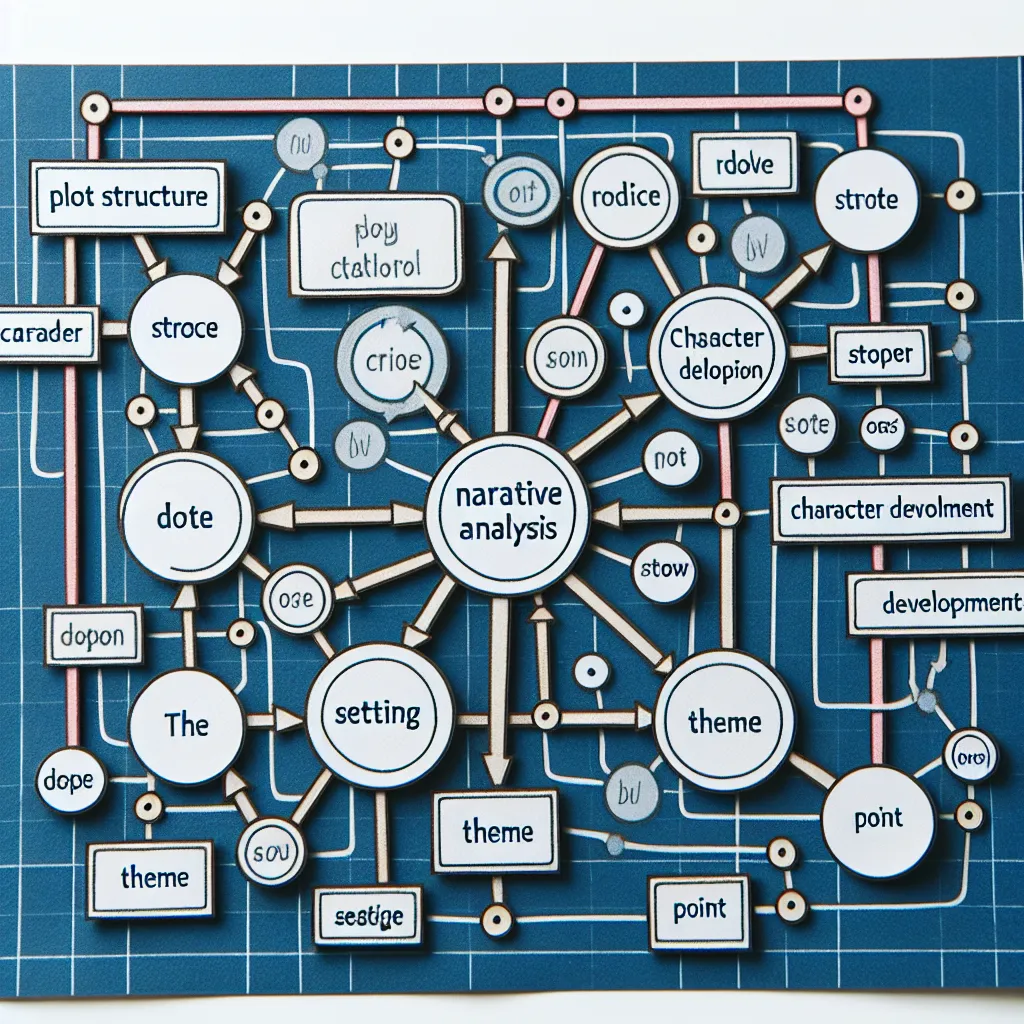Are you looking to enhance your English language proficiency? One effective approach is to analyze narrative techniques in literature and storytelling. This method not only improves your language skills but also deepens your understanding of English-language culture and storytelling conventions. In this article, we’ll explore various tips and strategies for improving your English through the analysis of narrative techniques.
Why Analyze Narrative Techniques?
Analyzing narrative techniques is a powerful tool for English language learners. It allows you to:
- Expand your vocabulary
- Improve your understanding of grammar and sentence structure
- Develop critical thinking skills
- Gain insights into cultural nuances and idioms
- Enhance your own writing and speaking abilities
 Narrative Analysis Diagram
Narrative Analysis Diagram
Key Narrative Techniques to Analyze
1. Plot Structure
Understanding how stories are structured can greatly improve your comprehension skills. Focus on identifying:
- Exposition: The introduction of characters and setting
- Rising action: Events that build tension
- Climax: The turning point of the story
- Falling action: Events following the climax
- Resolution: The conclusion of the story
By recognizing these elements, you’ll better understand how English-language stories are typically organized, which can aid in both reading comprehension and writing skills.
2. Character Development
Analyzing how authors create and develop characters can enhance your vocabulary and understanding of descriptive language. Pay attention to:
- Direct characterization: Explicit descriptions of characters
- Indirect characterization: Character traits revealed through actions, thoughts, and dialogue
This analysis will help you learn new adjectives and idiomatic expressions used to describe personalities and behaviors.
3. Setting and Atmosphere
Examining how authors create setting and atmosphere can improve your descriptive language skills. Look for:
- Sensory details: Descriptions that appeal to the five senses
- Figurative language: Use of metaphors, similes, and personification
By studying these techniques, you’ll expand your vocabulary and learn how to create vivid descriptions in your own writing and speaking.
4. Point of View
Understanding different narrative perspectives can enhance your grasp of grammar and sentence structure. Common points of view include:
- First-person: “I” or “we”
- Second-person: “you”
- Third-person limited: Focused on one character
- Third-person omniscient: All-knowing narrator
Analyzing how authors use different points of view will help you understand various grammatical structures and tenses used in English storytelling.
Practical Tips for Improving English Through Narrative Analysis
1. Read Extensively
Choose a variety of English-language texts, including short stories, novels, and even news articles. This diversity will expose you to different writing styles and narrative techniques.
2. Keep a Vocabulary Journal
As you read, note down unfamiliar words and phrases, especially those used in character descriptions or setting details. Look up their meanings and try to use them in your own sentences.
3. Practice Summarizing
After reading a story or chapter, try to summarize the main events and character developments. This exercise will improve your comprehension and help you internalize narrative structures.
 Summarizing Practice Illustration
Summarizing Practice Illustration
4. Analyze Dialogue
Pay close attention to how characters speak in stories. This can help you understand colloquial expressions, regional dialects, and informal language use in English.
5. Write Your Own Stories
Apply the narrative techniques you’ve learned by writing your own short stories in English. This practice will reinforce your understanding and improve your overall language skills.
6. Join a Book Club or Discussion Group
Engaging in discussions about stories with others can provide new perspectives and help you articulate your thoughts in English. Look for online forums or local groups dedicated to English-language literature.
7. Use Audiobooks
Listening to audiobooks while following along with the text can improve your pronunciation and listening comprehension. It also helps you understand how narrative pacing and tone contribute to storytelling.
Advanced Techniques for In-Depth Analysis
For those looking to take their English skills to the next level, consider these advanced techniques:
1. Comparative Analysis
Compare how different authors approach similar themes or use narrative techniques. This exercise can deepen your understanding of language nuances and cultural contexts.
2. Historical and Cultural Context
Research the historical and cultural background of the stories you read. This can provide insights into idiomatic expressions, cultural references, and the author’s choice of language.
3. Literary Devices
Study and identify complex literary devices such as foreshadowing, irony, and symbolism. Understanding these elements can significantly enhance your critical thinking skills in English.
4. Stylistic Analysis
Examine the author’s unique writing style, including sentence structure, word choice, and rhythm. This can help you develop a more sophisticated understanding of English prose.
For more advanced grammar tips that can enhance your narrative analysis skills, check out our guide on advanced grammar for creative writing.
Conclusion
Analyzing narrative techniques is a powerful method for improving your English language skills. By focusing on elements such as plot structure, character development, setting, and point of view, you can enhance your vocabulary, grammar, and overall comprehension of the English language. Remember to read widely, practice regularly, and engage with others in discussions about literature. With consistent effort and application of these tips, you’ll see significant improvements in your English proficiency.
We encourage you to start applying these techniques today. Choose a short story or novel and begin your analysis. Share your experiences and insights in the comments below, and don’t hesitate to ask questions or seek clarification. Happy reading and learning!




